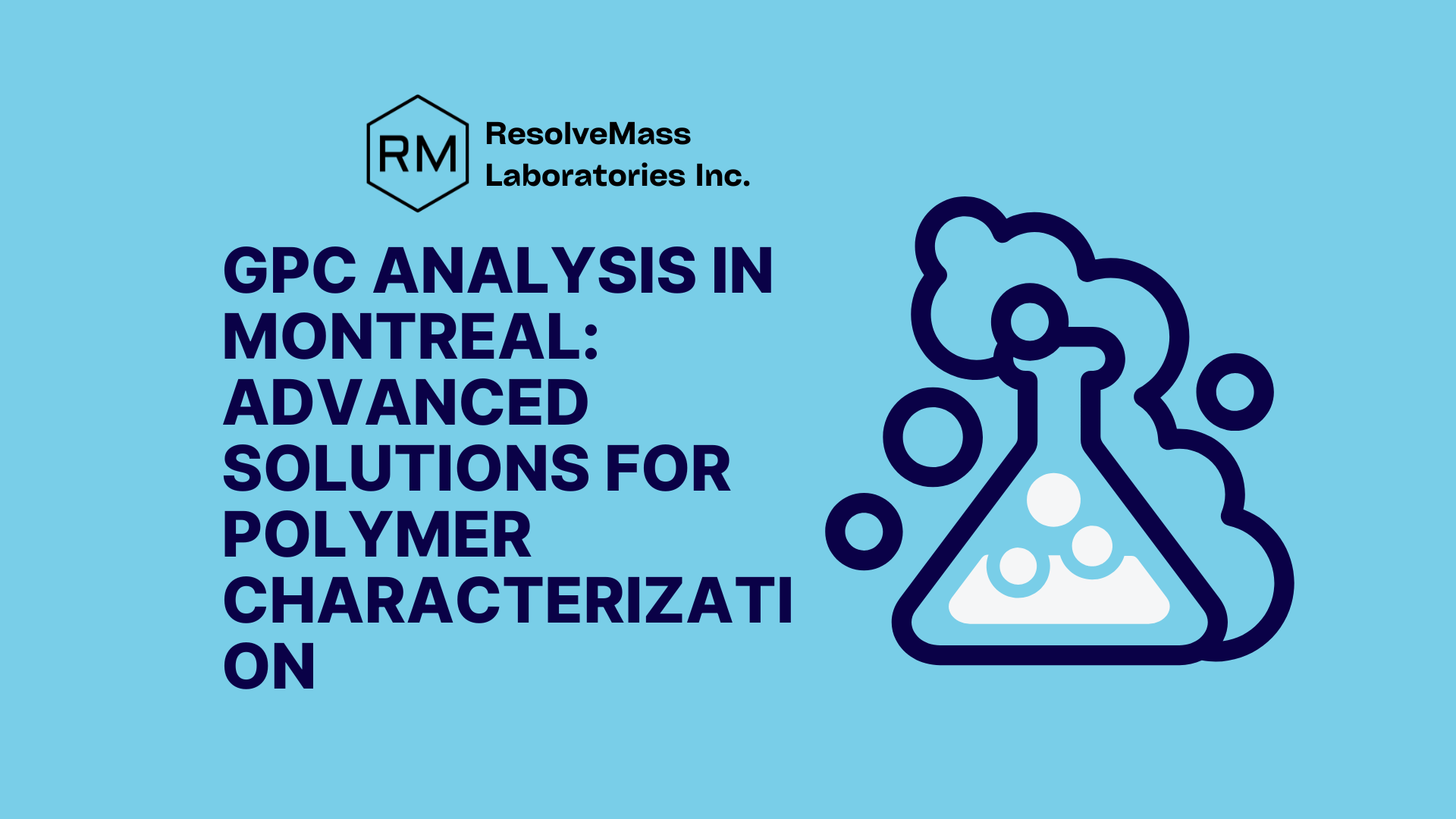Introduction
High Temperature GPC Analysis is a powerful technique for studying polymers that are hard to dissolve at room temperature, such as polyolefins, engineering plastics, and advanced high-performance materials. By applying gel permeation chromatography at elevated temperatures, researchers can accurately measure molecular weight and gain detailed insights into polymer structure and chain behavior. These insights go beyond what conventional GPC at ambient conditions can achieve, making it a preferred approach for industries that rely on precise molecular data.
At ResolveMass Laboratories Inc., we specialize in advanced GPC testing systems tailored for industries where dependable polymer analysis is critical. This expertise ensures material consistency, supports efficient manufacturing processes, and accelerates new product development. Because even small variations in polymer quality can impact performance and compliance, High Temperature GPC Analysis has become an essential tool in both research and industry applications.
Article Summary (Key Takeaways)
- High Temperature GPC Analysis enables characterization of polymers such as polyolefins, engineering plastics, and insoluble materials.
- Provides accurate molecular weight distribution data needed to predict polymer behavior and long-term performance.
- Plays a vital role in polymer quality assurance, compliance, and product development.
- Key applications include polypropylene, polyethylene, PET, PEEK, polyimides, and thermoplastics.
- Reliable outcomes require careful solvent selection, column choice, and integration with advanced detectors.
- ResolveMass Laboratories offers unmatched precision and reproducibility compared to standard GPC methods.
By combining these principles, industries gain clear insights into polymer properties, processing conditions, and performance reliability. This leads to fewer product failures and faster innovation timelines.
What is High-Temperature GPC Analysis?
High Temperature GPC Analysis is a specialized form of gel permeation chromatography performed at elevated temperatures (80–160°C). This approach is designed to dissolve polymers that cannot be properly analyzed under normal conditions. It provides detailed measurements of molecular weight distribution, chain branching, and polymer architecture for materials like polyethylene, polypropylene, and engineering plastics.
Unlike other molecular weight methods, this technique ensures high accuracy and reproducibility, even when standard solvents are ineffective. It also minimizes errors caused by incomplete dissolution, making sure the data reflects the true molecular profile of the polymer. This reliability makes it indispensable for industries where product quality and performance directly depend on molecular consistency.
Why High-Temperature GPC is Essential for Polymer Characterization
Many semi-crystalline and high-molecular-weight polymers remain insoluble in standard solvents at room temperature, which limits the effectiveness of conventional GPC. High Temperature GPC Analysis solves this by allowing complete polymer dissolution under controlled heating. Without this step, the data on chain length and molecular weight distribution could be misleading or incomplete.
Key Advantages of High-Temperature GPC Analysis
- Ensures complete dissolution of polyolefins and semi-crystalline polymers.
- Delivers precise molecular weight distribution measurements.
- Provides data needed to link polymer structure with performance properties.
- Improves control over material quality and production outcomes.
For additional details, see our guide on GPC Analysis of Polymers.
By linking molecular information with mechanical performance, this method strengthens quality assurance programs. As industries demand lightweight, durable, and regulation-compliant materials, High Temperature GPC Analysis continues to play a vital role in polymer science.
Applications of High-Temperature GPC Analysis
1. Polyolefins (Polyethylene and Polypropylene)
Polyolefins such as PE and PP are not soluble at room temperature, making High Temperature GPC Analysis the most effective choice for accurate testing. This method helps determine molecular weight averages (Mn, Mw), detect long-chain branching, and predict how polymers will behave during processing.
🔗 Related Resource: GPC for Polymer Quality Control
By analyzing these properties, manufacturers reduce processing errors, optimize production conditions, and ensure consistent quality across batches.
2. Engineering Plastics
Materials like PET, PBT, PEEK, polycarbonate, and nylon require precise characterization to ensure durability and reliability. High temperature analysis provides insights into chain scission, degradation, and thermal stability—factors that directly affect performance in demanding applications.
🔗 Explore: Methods of Measuring Polymer Molecular Weight by GPC
For industries like aerospace, automotive, and healthcare, understanding molecular distribution helps engineers design reliable, high-performance products such as gears, implants, and structural components.
3. Insoluble and High-Performance Polymers
Advanced polymers such as polyimides, aramids, and thermoplastics often need high-boiling solvents like trichlorobenzene (TCB) for analysis. Using High Temperature GPC Analysis, researchers can evaluate these difficult materials and optimize them for next-generation technologies.
🔗 Learn more: Size Exclusion Chromatography Service
This data is crucial for designing polymers that must perform under extreme conditions such as heat, stress, or exposure to chemicals—making it vital for aerospace, defense, and industrial innovation.
Key Factors for Reliable High Temperature GPC Analysis
| Factor | Why It Matters | ResolveMass Approach |
|---|---|---|
| Solvent Selection | Ensures complete polymer dissolution | Expertise in TCB, o-dichlorobenzene |
| Column Choice | Determines clarity of molecular distribution | Tailored GPC Column and Detector Selection |
| Detector Systems | Improves precision with LS & RI detectors | Advanced calibration strategies |
| Sample Prep | Key for accuracy in final results | See our GPC Sample Preparation Guide |
At ResolveMass, we optimize each factor to guarantee reproducible and precise results, avoiding degradation and ensuring accurate calibration every time.
Benefits of High-Temperature GPC Analysis for Industry
- Improves material performance and durability.
- Reduces defects and ensures consistent production quality.
- Helps meet regulatory standards in medical, packaging, and aerospace applications.
- Accelerates R&D cycles with reliable molecular characterization.
🔗 See: Molecular Weight by GPC
By adopting High Temperature GPC Analysis, industries cut costs, speed up innovation, and maintain a competitive advantage.
Common Challenges & Solutions in High Temperature GPC
- Incomplete Polymer Dissolution → Use optimized solvents and temperature control.
- Column Degradation → Routine monitoring and correct column selection.
- Baseline Drift → Apply precision calibration with advanced detectors.
- Sample Degradation → Use stabilizers and controlled heating conditions.
For troubleshooting guidance, read: GPC Errors in Polymer Molecular Weight Analysis.
By addressing these challenges proactively, laboratories achieve long-term reliability and minimize rework or equipment issues.
Conclusion
High Temperature GPC Analysis is a vital tool for characterizing polymers such as polyolefins, engineering plastics, and insoluble polymers. It delivers accurate molecular weight data, supports compliance, and enhances performance in industries where precision is critical.
At ResolveMass Laboratories Inc., we combine advanced technology with deep expertise to provide accurate and reproducible GPC results. Our services support both scientific innovation and industrial applications, helping clients bring high-quality materials to market with confidence.
📩 Ready to get started? Contact us today to discuss your project.
FAQs on High Temperature GPC Analysis
Polyolefins like polyethylene (PE) and polypropylene (PP) are insoluble at room temperature, which makes conventional GPC methods ineffective. High Temperature GPC Analysis ensures complete dissolution of these polymers, allowing accurate determination of molecular weight and branching. This data is critical for predicting their mechanical strength, durability, and processing behavior.
The most common solvents are trichlorobenzene (TCB) and o-dichlorobenzene, as they can dissolve high-molecular-weight and semi-crystalline polymers effectively. These solvents provide stability at elevated temperatures, ensuring that polymer chains are fully dissolved. Choosing the right solvent is key to obtaining reliable molecular weight distribution results.
High Temperature GPC Analysis can measure important parameters such as number-average molecular weight (Mn), weight-average molecular weight (Mw), and molecular weight distribution. These values give researchers and manufacturers insights into how polymers will perform under different processing and end-use conditions, reducing the risk of unexpected material failures.
Unlike viscosity or end-group analysis, which provide only average values, High Temperature GPC Analysis delivers a full molecular weight distribution profile. This allows for deeper understanding of chain branching, molecular uniformity, and structural variations. As a result, it offers more reliable data for industries that require strict quality control.
Yes, branching can be detected through detectors like light scattering and viscometry that are integrated with high-temperature GPC systems. Identifying long-chain branching is important because it directly affects polymer melt strength, toughness, and overall processability. This makes it a valuable capability for manufacturers developing advanced plastic materials.
The main challenges of High Temperature GPC Analysis include handling high-boiling solvents, the need for specialized columns, and preventing polymer degradation during testing. These limitations can be managed with strict temperature control, stabilizers, and expert laboratory practices. When performed correctly, the technique remains highly reliable for complex polymers.
Samples are carefully dissolved under controlled heating conditions, usually with the help of stabilizers to prevent thermal or oxidative breakdown. Proper preparation ensures that the polymer is fully dissolved before injection into the system. At ResolveMass, strict protocols are followed to guarantee reproducibility and accuracy in every analysis.
Yes, biodegradable polymers can be analyzed if they remain stable under the required elevated temperatures. Care must be taken to avoid premature degradation during heating. When handled with optimized conditions, this method provides valuable insights into molecular properties of sustainable materials.
References
- Rozio, M. G. (2025). Correcting detection and quantitation bias in extractables and leachables testing. Journal of Pharmaceutical Sciences, 114(4), 1234–1245. https://doi.org/10.1016/j.xphs.2025.01.001
- Balfour, H. (2022, April 29). Advancing extractables and leachables testing. European Pharmaceutical Review. https://www.europeanpharmaceuticalreview.com/article/170814/advancing-extractables-and-leachables-testing/
- Eckford, C. (2024, January 22). Single-use systems to drive E&L testing market growth. European Pharmaceutical Review. https://www.europeanpharmaceuticalreview.com/news/196367/single-use-systems-to-drive-el-testing-market-growth/


